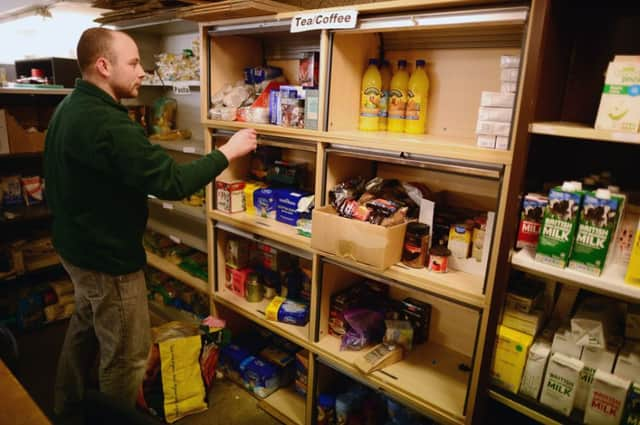Hugh Reilly: Poverty of ideas on dependency


IN DAYS gone by, cash-poor citizenry were forced to endure the humiliating ritual of asking a friendly bank manager for credit. The mendicant usually left the manager’s office empty-handed and in urgent need of anti-inflammatory pills to ease the pain of housemaid’s knee brought on by the supplicant pose adopted during the begging routine.
Thankfully, the arrival of innovative payday loan companies has changed the previously stuffy cash-advance process. Modern loan companies have deservedly received much public opprobrium for the astronomical rates of interest charged to their desperate customers. But, on the other hand, businesses that make Shylock seem like a manic depressive on a spending spree instantly inform applicants that their plea for dosh has been accepted. Wonga and others have cut through pesky red tape – such as credit checks – that previously slowed down the procedure of transforming a free man into the bonded serf of a rapacious financial institution.
Advertisement
Hide AdAdvertisement
Hide AdThese days, bank branches are being trimmed faster than bushes pruned by a crystal meth-fuelled topiarist. However, one type of bank is enjoying something of a renaissance – the food bank. Demand for food bank services has tripled in the past two years.
Charity organisations claim the remarkable rise in people seeking such a thing as a free lunch is down to the UK government’s welfare reforms. Michael Gove, the Education Secretary, denies this; he believes the surge is a result of the poor being unable “to manage their finances”.
Others in the coalition government probably imagine the impoverished enjoy a bit of retail therapy when they cross the threshold of a Salvation Army grocery outlet. Admittedly, the food bank shopping experience is enhanced by not having to queue at a checkout or listen to elevator music while piloting one’s trolley around an armada of mobility scooters and zombified herds of the obese grazing the shelves for items to satisfy their serial snacking disorder.
A collection of charities have combined to launch Scotland’s Outlook, a campaign that highlights what the group calls a “humanitarian crisis” caused by poverty. According to the group, the country is being “battered” by the quadruple whammy of benefit cuts, stagnant wages, higher energy bills and employment insecurity.
The so-called bedroom tax and other assorted attacks on the most vulnerable are something of a necessary evil if the nation is to put its finances in order; after all, levying higher income tax on the better-off is not an option in a society that tolerates million-pound bonuses being paid to bank executives running entities bailed out at the public purse’s expense. Pay freezes, or rises well below inflation, help maintain competitiveness and increase the salaries of the deserving rich. In 2013, directors of FTSE companies snaffled an extra 14 per cent on their remuneration packages, a sum almost seven times greater than the 2.1 per cent rise in average earnings. Who could now doubt that we’re all in it together?
I salute those who fight for the least well-off, organisations such as the Child Poverty Action Group, Shelter Scotland and Oxfam. I do, however, believe that, for the best possible motives, they are prone to exaggerating the extent of deprivation. For one thing, we are not talking about absolute poverty, the kind of crippling circumstance in war-torn Africa that we fleetingly see on our TV screens before hitting the remote for Coronation Street. We are discussing relative poverty; that is, an element of society struggling to get by on 60 per cent of the median income. They are worse off than the majority of their peers, unable to participate in activities that most of us would take for granted – foreign holidays, concerts, cinema visits and much more.
According to the Scottish Council for Voluntary Organisations, 23,000 people turned to food banks in the past six months. I have no doubt that being in relative poverty can be physically debilitating and depressing. However, the evidence of my own eyes tells me that starvation and malnutrition do not exist in Scotland. On a simple stroll through a shopping centre serving a deprived area, overnourished individuals dominate the landscape.
When I taught in less-than-salubrious locations, such as Drumchapel, Pollok and Govanhill, I rarely encountered a child who appeared to be on hunger strike to stop homework. I did, however, interface with many cherubs with fast pie-eating hands. Clearly, with regard to the question “Heat or Eat?” the majority choose the latter course of action.
Advertisement
Hide AdAdvertisement
Hide AdIt’s an unspeakable truth, denied by the poverty industry, that part of the problem is the sheer fecklessness of some of those on the breadline. Until last year, I was a resident of the undesirable G21 postcode that covers Glasgow North East. (In the 2001 census, nearly half of people in the constituency said they did not have any educational qualifications – the fourth highest figure in the UK – and almost two-thirds said they had no car.) On visits to the corner shop – which, due to its intricate, barbed-wire roof arrangement and steel shutters, resembled a Siegfried Line pillbox – I regularly witnessed customers buying shedloads of Strike It Lucky scratchcards. That there were four thriving fast-food takeaways within a 300-yard radius lent credence to my suspicion that neighbours were somewhat ignoring the government’s five-a-day health message. Pubescent proto-neds who loitered past my window invariably sported the latest Old Firm replica football shirt and wore brand name trainers such as Nike and Adidas.
In my view, a fairer redistribution of wealth is needed if we wish to avoid increasing the already considerable under-class that blights Scotland. In the meantime, unless we do more to encourage vulnerable people to take more responsibility for their lives, the dependency culture will continue to trap individuals in a cycle of poverty. And you can take that to the bank.